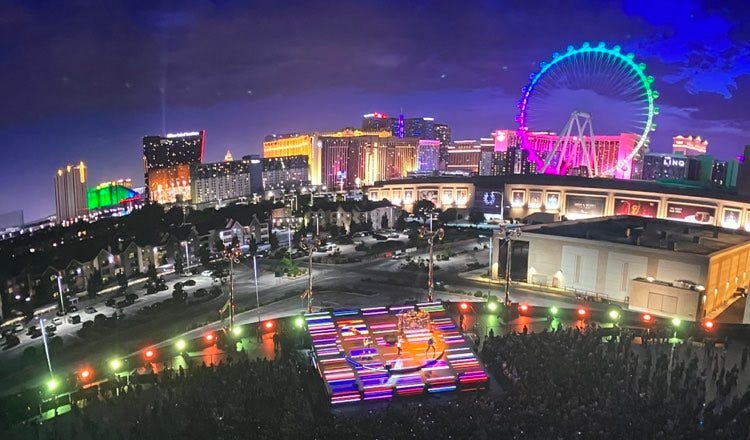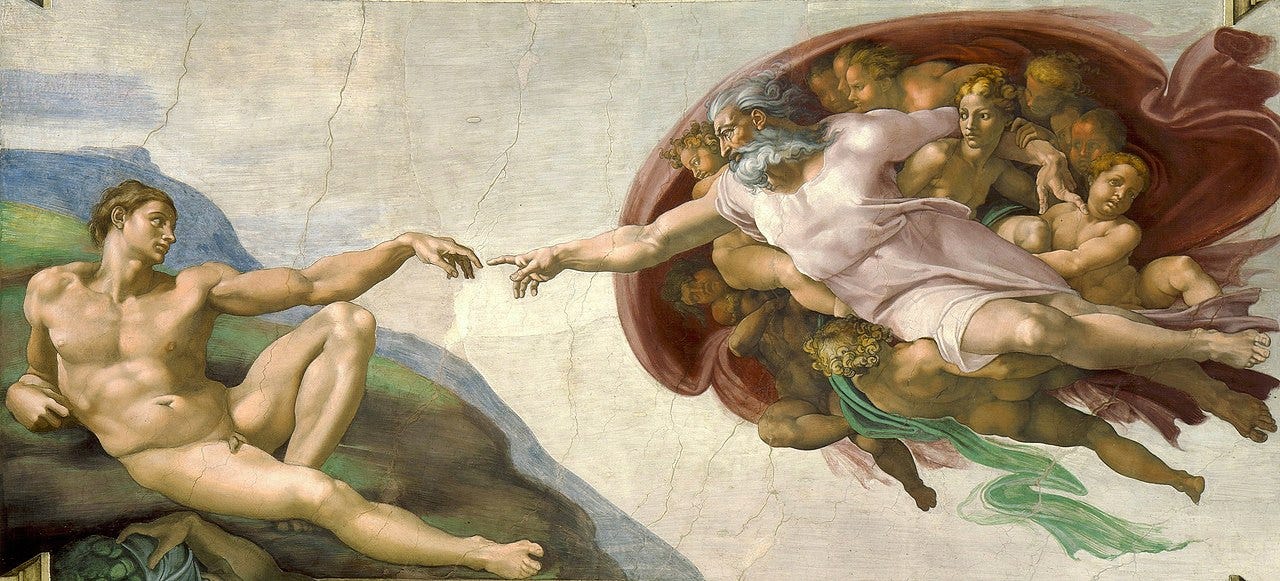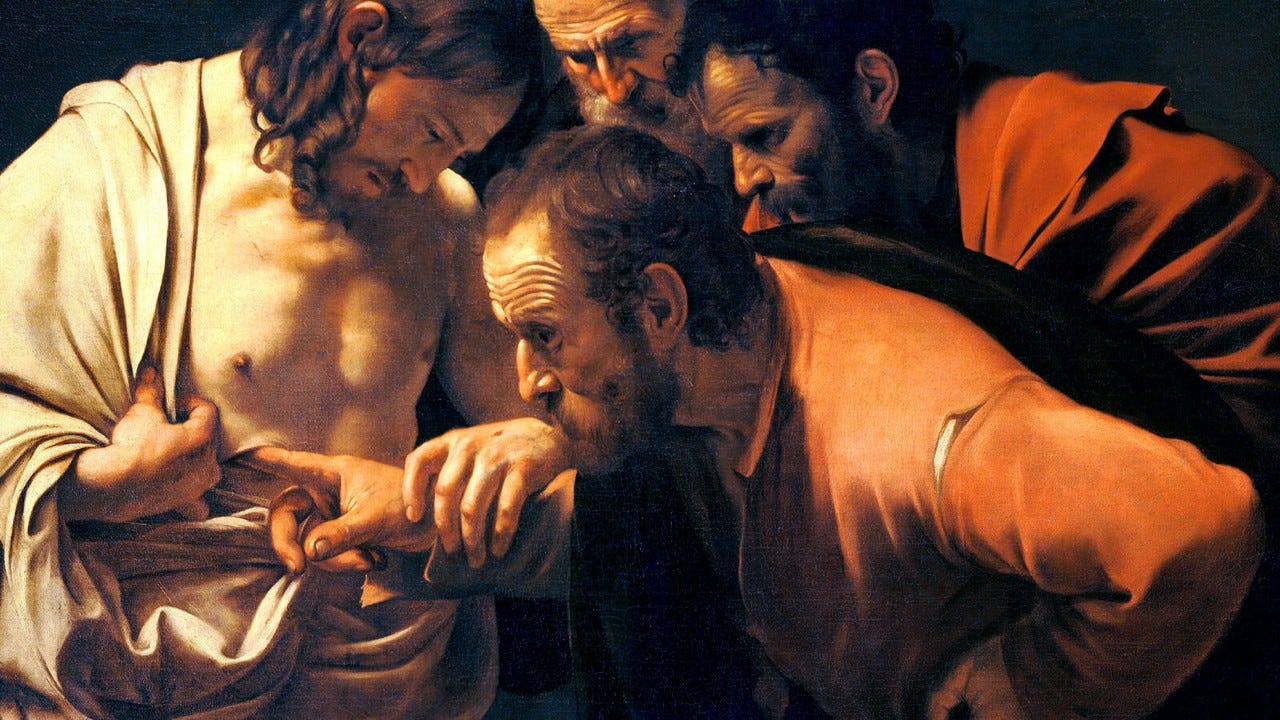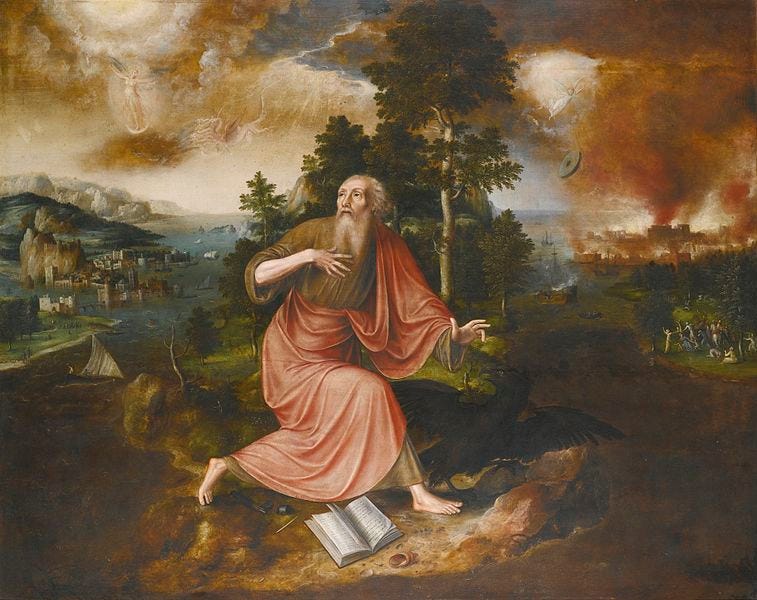The Spectacle of Spectacle (Part 2)
How God Gets Our Attention for Our Good
Dear Friends,
October was a month of more regularity for us here in Springfield: church on Sundays, prepping and teaching my Christian ethics symposium on Thursdays, keeping up with communications and meeting with people during the week. Megan has her feet under her with her 20 second graders Mondays through Fridays and is seeing kids progress in their learning (though not at the same pace). To top it off, our Midwest Fall has been beautiful.


One out-of-the-ordinary highlight of October was a quick 48-hour trip to Roanoke, VA, to see Chloe and her husband, Brian. Chloe is now into the second year of her two-year Reformed Youth Ministries internship at Christ the King Presbyterian Church, while Brian is gainfully employed and taking classes through Multnomah Seminary to show himself approved to eventually become a church planter. We are grateful for God’s leading in their lives together and enjoyed seeing them up close and personal for a few days in Roanoke.

Now in November, we look forward to having three of our four girls with us for Thanksgiving here in Springfield as well as on the farm in Pike County. We love the season and give thanks to God (and to many of you who financially support us) for his blessings.
May you have a blessed Thanksgiving. And thanks, as always, for reading Second Drafts.
Craig (for Megan)
PS: Exodus Church’s organizing service is set for Sunday evening, November 19, from 6-7 p.m. at our site at 2450 Taylor Avenue, Springfield, IL 62704. Dr. Bryan Chapell, President Emeritus of Covenant Seminary, will be our guest preacher as we worship, install elders, and are recognized as a “particular” congregation of the Presbyterian Church in America. Refreshments will be served afterward, and Megan and I would be honored if you’re in the area and joined us to celebrate this milestone. Email me if you need more details.
Readers React to “Why the Holy Land Isn’t”
I always appreciate hearing from readers. Here are several reader perspectives in response to “Why the Holy Land Isn’t,” my extra post last month. Thanks to those who read the special edition post and engaged with its more theological material.
“I consider myself woefully ignorant about nearly all things Middle East (I need a Middle East for Dummies book). Sometimes I try to read stuff and I just come away confused because there is a presupposition of knowledge that I don’t have. So reading things like this is helpful, even in just being able to take away a couple things I didn’t know before.”
Here’s a note of appreciation for the four Christian theologies of Israel and the land:
“This was a FANTASTIC discussion of the differing views and the implications of each. I, too, grew up under #1 [premillennial dispensationalism], but have most definitely shifted to #2 [traditional Reformed] thanks to solid teaching. So many in my world, especially older adults, are still #1s, which makes discussion of the current events difficult. Thank you for this clear summary. Hoping to use it as a launching pad for talking through these things!”
I appreciate the humility of this honest confession, as well as the reader’s conclusion:
“I’ve grown accustomed to getting the awkward side-eye among my fellow [Baptist] congregants when I let slip that ‘Israel’ (the land) is not ‘Israel’ (the people), and that it is Christians who are the ‘chosen people,’ not people who have a certain genealogy or ethnicity. That’s not to say they don't have a place in God's grace, as you said.
Moreover, I continue to struggle to extend grace to otherwise earnest folks who (in my self-righteous opinion) hold to these eschatological assumptions. Yeah, yeah, ‘there but for the grace of God go I,’ but I'm well far from sanctification.
That said, I appreciate your call for compassion and concern. Regardless of these theological distortions (and political machinations, et al.) it seems clear that these long-simmering Middle East ‘troubles’ are sparking up into a more formal conflict. Christians have a place to be the peacemakers.”
Kudos to dads of adult children who still engage their grown kids on theological matters, especially as they continue to process and come to grips with their own past:
“This was excellent. Thanks for taking time to write it. Going to send my kids, in large part for the succinct overview of the four eschatological camps as they relate to Israel.
Now, then, when you pen a succinct critique of pre-millennial dispensationalism, I’ll send that (or not) to the extended family who bore me, raised me, and grew up with me (with Scofield reference bibles, [dispensational seminary] degrees, and Tim LaHaye sections in their libraries).
While the exegesis is important, I wonder why, after 1,850 years of reasonably consistent understanding of these things, some folks decided it was all wrong, penned up something better, and the entire ‘evangelical’ church seemed to go along for a hundred years?”
Finally, I was glad to hear from this friend who shared her ache concerning it all:
“Two words: Spot. On.
I’m disappointed to see my own tribe adding Israel’s flag to their profile pictures and saying we must by default support Israel (both the people AND the land) because they are God’s ‘chosen people.’ Um, have they read beyond the OT? ‘Israel’ is now the Church (1 Peter 2:4-10).
In addition, I deplore the actions of Hamas, as well as lament the civilian cost for both Jews and Palestinians. The history is long, complex, and painful, with moral failures on both sides. I grieve even more so that Romans 3:12 is painfully clear: ‘All have turned away, they have together become worthless; there is no one who does good, not even one.’
Thank you as always for your very thoughtful analysis of significant issues that affect us all, no matter where in the world they are.”
These (and other) notes are encouraging to me, not only as a writer who writes to learn, but also as a wanna-be pastor who cares for people. Your spirit of working through what you theologically think to respond Christianly in the world is inspiring.
May what we know form who we are and motivate what we do as people who love and follow Jesus. Lord, have mercy upon your world. I pray for the peace of Jerusalem.
The Spectacle of Spectacle (Part 2)

(Note: This is the second part in a two-part series. If needed, read/re-read part one here.)
spec·ta·cle /ˈspektək(ə)l /
noun | something exhibited to view as unusual, notable, or entertaining. especially : an eye-catching or dramatic public display.
While it makes me seem much older than I am (or at least feel), I grew up watching (and enjoying) The Lawrence Welk Show every week, fascinated by the old songs and tap dance routines. Part of my interest was nostalgic in learning about the music of my grandparents’ generation; part of it was educational in seeing up close and personal the different instruments and learning about how each was played.
Looking back, I recognize some of the schmaltz to it. Where else could someone be introduced as a “sensational young accordionist” with no irony whatsoever (especially since Myron Floren absolutely shredded the thing)? Where else could one witness a tap-dancing marimba player (or was it a marimba-playing tap dancer) and wonder—if only for a moment—what it might take to follow such a dream? Where else could one watch musicians—many from the upper Midwest, don’t cha know?—make it big with a completely counter-cultural look and sound in 1960s and 70s California?
Watching The Lawrence Welk Show was only one hour a week. Back in those dark days before “on demand” programming, if you missed it on Saturday night, you missed it (possibly forever); there was no catching it the next day on YouTube. Life went on, and there was plenty of other stuff in the real world to do until the next week’s show. (Ironically, we were warned back then of the dangers of too much television, but trust me: the media proliferation was nowhere near what it is now.)
Not only did we have fewer entertainment options, the entertainment we had was less slick and overproduced, sometimes painfully so. Truth be told, I watched the Welk show then because Lawrence and everyone else on those Saturday nights seemed so…human; it was just them and their instruments in the ugliest of costumes under the most basic of lighting on television. The humanity was real…and it was glorious.
But what was most glorious and always my favorite part of the show was when Lawrence would invite the studio audience to get up and dance. The cameras would turn to capture those of the Silent/so-called Greatest Generation, dressed to the nines and dancing close. Even watching back in the late 70s and early 80s, it was a window to another world: everyone knew how to dance with a partner—none of today’s gyrate-in-the-general-vicinity-of-someone silliness—and I imagined my own grandparents popping onto the screen, smiling and dancing, having made the journey from rural Illinois to southern California (a trip that seemed beyond comprehension to me) to be part of the show and the rest of their generation who had been through so much.
It’s hard to explain, but there was a connection made—to my grandparents, to their generation, to their world—that just required a good song, a decent arrangement, a few talented musicians, a simple stage with lights, and people who weren’t worried about getting made up to be something they weren’t. They were nothing if not real, and, as Lawrence reminded us each week, it was “wonderful, wonderful.”
Readers Weigh in on Spectacle
My contention is our idolatry of spectacle and worship of activity stems from our desperation to make a connection and fear of experiencing such personal intimacy. What kicks in are our twisted public relation campaigns (often facilitated by social media) to convince ourselves and others we are not as alone as we feel.
Several readers had thoughts on this:
“Your overall viewpoint about concerts and just needing constant stimulation in general was pretty spot on, in my opinion. I have already seen the very thing you talked about—I just happened to notice on YouTube the other day that someone had posted the full Peter Gabriel concert taken from a seat somewhere in the first 10-15 rows. I might enjoy taking a couple pics and maybe a short video clip or two (never an entire song) to share a brief glimpse of my experience, but other than that, I want to just take in the concert as an audience member, not as a conduit to a future social media or YouTube audience.”
This reader shared:
“I have often attributed the ‘spectacle’ phenomena to modern day weddings, as well. You know the ones: the elaborate destination weddings, the intricately choreographed (and expensively curated) performative affairs where the guests are given specific dress codes, etc., that appear to be intended as perfected photo-ops more than as sacred rituals.”
Trying to capture the moment is what people do on social media; at times, Christians make an attempt to manufacture one on Sunday morning. As this reader observed,
“As a battle-scarred veteran of 90’s mosh pits, it drives me absolutely batty to see ‘da yoots’ standing still holding their phones at concerts. Conversely, as a congregant at a mainstream church, I find myself smothering a sign and averting my eye rolls at the showy superficial aspects of modern evanjelly-cool worship.”
Even superficiality can be hard to hold onto. This reader returns to Sphere and writes:
“I watched lots of Sphere YouTube videos and it seems there is little to sustain the interest after seeing the screen (beyond the band, which I have really enjoyed; Bono is just so good commanding the performance). I can almost put us there, saying, ‘Wow, that’s big,’ and then enjoying the music. We have to build these things as a culture; it’s what we do. But they flash so bright and burn out so quick, that they always remind me I like simple things more. I’ll save the epic and unimaginable for the gates of heaven.”
Can there be actual purpose to spectacle? If so, can that purpose do us actual good?
Despite my critique last month—what one reader called “fatalistic”—that ended with,
“We have allowed spectacle to not only become its own idol, but authorized it to become its own monster.
Unfortunately, humans have never done well with idols or monsters.”
—my answer to both questions is, “Yes. There can be purpose and good in spectacle.”
We’re just not meant to want it the way we so often do.
The God of Spectacle
The God of the Bible is the creator and practitioner of spectacle—“the OG,”1 as the kids say. From the beginning—that is, the literal, actual beginning—God’s first spectacle was speaking the universe and everything in it into existence (Genesis 1:1).
How’s that for an opening act?
But he didn’t stop with creation. The Old Testament overflows with God’s spectacles which dramatically capture our imaginations in ways that go beyond didactic teaching. Consider the Flood (Genesis 6-8) or the Plagues, Passover, and Exodus (Exodus 6-15:19), just to name a few. These were not small-scale tricks of light and magic, nor were they digital in nature; on the contrary, they were massive analog acts (with increasing actual archaeological evidence) that got the attention of all involved and demonstrated God’s concern for the world he made and the oppressed within it.
How about the New Testament? No lack of spectacle there, either: Jesus the God-Man performing multiple miracles, turning water into wine, walking on water, feeding five and four thousand with a few fish and some loaves of bread. People are raised from the dead, then there’s the Transfiguration…the Crucifixion…and the Resurrection, which has to be the greatest curtain call in the history of curtain calls.
But let’s keep going. Later, at Pentecost, God the Holy Spirit sends a mighty rushing wind and tongues of fire that rest upon the heads of members of the early Church and enables them to understand each other in their own language, eventually resulting in the taking of the Gospel to the ends of the earth before Christ returns, which John was shown and shared by way of the strangest of visions in the Book of Revelation.
Spectacle. All of it.
What matters is this: the point is not the spectacle, but the one to whom it points—the God who created it to get our attention for our good. From 1 Kings 18:11-13:
“And behold, the Lord passed by, and a great and strong wind tore the mountains and broke in pieces the rocks before the Lord, but the Lord was not in the wind. And after the wind an earthquake, but the Lord was not in the earthquake. And after the earthquake a fire, but the Lord was not in the fire. And after the fire the sound of a low whisper. And when Elijah heard it, he wrapped his face in his cloak and went out and stood at the entrance of the cave. And behold, there came a voice to him and said, “What are you doing here, Elijah?”
To remind us who we’re dealing with and hold our attention long enough to hear him whisper has always been God’s purpose in spectacle. Whether it was silencing the world’s wickedness of sin with water (at least for a time), or bringing his covenant people out of the oppression of Pharaoh’s dynasty, or sending Christ to be crucified and bear his wrath on behalf of his chosen people before resurrecting him and giving us eternal hope, God has always acted in the biggest of ways to tell us of his most personal of ends: that we would be his people, and he would be our God.
May God’s spectacle catch your eye, that he may whisper of his love to your heart.
(Idea: Find a quiet place, close your eyes and dust off your imagination, and listen to this song by my friend, Michael Card, as a soundtrack to God’s spectacular love. Until next time…)
Thanks for considering becoming part of our support team (all gifts tax-deductible).
Know someone interested in our ministry with Exodus Church in Springfield?
"Original Gangster”







